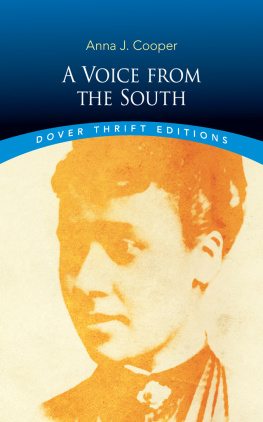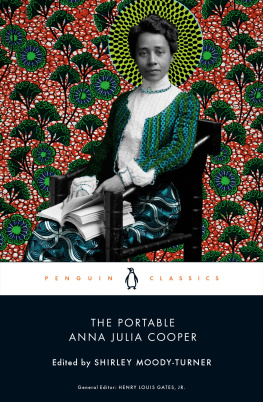Cooper Anna Julia - A Voice from the South
Here you can read online Cooper Anna Julia - A Voice from the South full text of the book (entire story) in english for free. Download pdf and epub, get meaning, cover and reviews about this ebook. year: 2016, publisher: Dover Publications, genre: Science. Description of the work, (preface) as well as reviews are available. Best literature library LitArk.com created for fans of good reading and offers a wide selection of genres:
Romance novel
Science fiction
Adventure
Detective
Science
History
Home and family
Prose
Art
Politics
Computer
Non-fiction
Religion
Business
Children
Humor
Choose a favorite category and find really read worthwhile books. Enjoy immersion in the world of imagination, feel the emotions of the characters or learn something new for yourself, make an fascinating discovery.
- Book:A Voice from the South
- Author:
- Publisher:Dover Publications
- Genre:
- Year:2016
- Rating:3 / 5
- Favourites:Add to favourites
- Your mark:
- 60
- 1
- 2
- 3
- 4
- 5
A Voice from the South: summary, description and annotation
We offer to read an annotation, description, summary or preface (depends on what the author of the book "A Voice from the South" wrote himself). If you haven't found the necessary information about the book — write in the comments, we will try to find it.
A Voice from the South — read online for free the complete book (whole text) full work
Below is the text of the book, divided by pages. System saving the place of the last page read, allows you to conveniently read the book "A Voice from the South" online for free, without having to search again every time where you left off. Put a bookmark, and you can go to the page where you finished reading at any time.
Font size:
Interval:
Bookmark:
A VOICE FROM THE SOUTH

Anna Julia Cooper
Introduction by Janet Neary
DOVER PUBLICATIONS, INC.
MINEOLA, NEW YORK
DOVER THRIFT EDITIONS
GENERAL EDITOR: SUSAN L. RATTINER
Copyright
Introduction Copyright 2016 by Janet Neary
Copyright 2016 by Dover Publications, Inc.
All rights reserved.
Bibliographical Note
This Dover edition, first published in 2016, is an unabridged republication of the work originally published by The Aldine Printing House, Xenia, Ohio, in 1892. An Introduction written by Janet Neary has been specially prepared for the present edition.
Library of Congress Cataloging-in-Publication Data
Names: Cooper, Anna J. (Anna Julia), 18581964, author.
Title: A voice from the south / Anna Julia Cooper ; introduction by Janet Neary.
Description: Mineola, New York: Dover Publications, Inc., 2016. | Series: Dover thrift editions
Identifiers: LCCN 2016002408 | ISBN 9780486805634 | ISBN 0486805638 | eISBN: 9780486812069
Subjects: LCSH: African American womenSouthern StatesSocial Conditions19th century. | African American womenSouthern StatesHistory19th century. | African AmericansSouthern StatesSocial conditions19th century. | African AmericansSouthern StatesHistory19th century. | Southern StatesRace relations.
Classification: LCC E185.86 .C587 2016 | DDC 305.48/896073075dc23
LC record available at http://lccn.loc.gov/2016002408
Manufactured in the United States by RR Donnelley
80563801 2016
www.doverpublications.com
INTRODUCTION
An Arc of Light:
Anna Julia CoopersA Voice from the South
WRITTEN IN 1892, Anna Julia Coopers groundbreaking essay collection A Voice from the South, by A Black Woman of the South is a cornerstone of black feminist and political theory, a literary achievement, and a call to action that remains relevant today. As an interrogation of power, a critique of empiricism, and a revelatory work of intersectional analysis, Coopers contribution in Voice is often condensed into her now well-known declaration, Only the Black Woman can say, when and where I enter, in the quiet undisputed dignity of my womanhood, without violence and without suing or special patronage, then and there the whole Negro race enters with me.
Born into slavery in Raleigh, North Carolina, in 1858, Cooper rose to prominence as a leading scholar, educator, and activist at the end of the nineteenth century, producing Voice while she was the principal of the renowned M Street High School in Washington, D.C. An active public intellectual, Cooper was selected to speak before the Worlds Congress of Representative Women in 1893 and at the Pan-African Congress Conference in London in 1900.
Characterized by an emphasis on debate and her inimitable wit, the essays which comprise Voice feel simultaneously urgent and modern even while they bear the imprint of late-nineteenth-century social thought. In a passage which showcases both her rhetorical savvy and her analysis of the ways power dictates the very terms of social definition, Cooper rejects external determinations of what is considered womanly, arguing that the world needs more women who can think as well as feel, and who feel none the less because they think.
Coopers polemical style and insistence on embodied knowledge are also key to Voices value as a work of literary criticism. At a moment when black authors were subject to patronizing protocols authorizing their literary contributions, Cooper defiantly takes up the position of the critic, piercing the assumption that white authors have access to universal truth. She criticizes William Dean Howells, among others, for tone-deaf and spurious characterizations of black people, which they offered as representative. Yet Coopers polemicism and close engagement with the social logic of her time are also responsible for the most troubling aspects of the text: its orientalism and Islamophobia. Overturning received notions of environmental determinism, Cooper underscores the vitality of black peoplehighlighting both their cultural accomplishments and biological potentialin part by drawing on racial hierarchies inherent in now outdated notions of civilization.
Coopers intersectional analysis and insistence on black womens essential role in social progress remain central to a contemporary scholarly agenda, even while her engagement with the social preoccupations and literary forms of her time mark its limits.
JANET NEARY
Notes
Anna Julia Cooper, A Voice from the South (New York: Oxford University Press, 1988): 31.
Shirley Moody-Turner, Dear Doctor Du Bois: Anna Julia Cooper, W. E. B. Du Bois, and the Gender Politics of Black Publishing, MELUS 40.3 (Fall 2015): 47-68, 47.
Cooper belongs to a formidable group of black women scholars and activists in the late nineteenth century, including Maria Stewart, Sojourner Truth, Fannie Barrier Williams, Charlotte Forten Grimk, Ida B. Wells, Fannie Jackson Coppin, Victoria Earle Matthews, Frances Harper, and Mary Church Terrell. The following texts place Coopers legacy in the context of these other black women scholars and activists: Mary Helen Washington, Introduction, A Voice from the South (New York: Oxford University Press, 1988): li; Vivian M. May, Writing the Self into Being: Anna Julia Coopers Textual Politics, African American Review 43.1 (Spring 2009): 17-34, 17; and Beverly Guy-Sheftall, Black Feminist Studies: The Case of Anna Julia Cooper, African American Review 43.1 (Spring 2009): 11-15, 11.
For a more comprehensive biography, see Mary Helen Washington, Introduction, A Voice from the South (New York: Oxford University Press, 1988).
As Washington notes, the children ranged in age from six months to twelve years and were the grandchildren of her half-brother, xxxviii.
Anna Julia Cooper, Slavery and the French Revolutionists, 1788-1805. Trans. Frances Richardson Keller (Lewiston, NY: Edwin Mellen Press, 1988). On her other writings, see The Voice of Anna Julia Cooper: Including a Voice from the South and Other Important Essays, Papers, and Letters, Eds. Charles Lemert and Esme Bhan (New York: Rowman & Littlefield Publishers, 1998): 306. Lemert and Bhans book reprints much of her writing, including her two memoirsone reflecting on her experiences at the Sorbonne and the other offering reminiscences of the Grimk family and her early years in D.C. On the evolution of Coopers writing, Moody-Turner writes that By adding an examination of the material and political consequences of popular portrayals of African Americans and by critiquing her earlier position on voice, voicelessness, power, and domination, [Coopers] later texts suggest that [she]continued to reflect on and revise her critical strategies for promoting agency, voice, and self-definition, 8.
Shirley Moody-Turner, Preface, Anna Julia Cooper: A Voice beyond the South, African American Review 43.1 (Spring 2009): 7-9, 7.
Cooper, 50.
May, Writing, 17.
See Kyla Schuller, Biopolitics of Feeling: Race, Sex, and Impressibility in the Nineteenth-Century United States (forthcoming from Duke University Press).
Coopers influence is evidenced by the intellectual debt acknowledged by the most foundational black feminist texts of our own era, including Paula Giddings When and Where I Enter: The Impact of Black Women on Race and Sex in America (1984) and Hazel Carbys Reconstructing Womanhood: The Emergence of the Afro-American Woman Novelist
Next pageFont size:
Interval:
Bookmark:
Similar books «A Voice from the South»
Look at similar books to A Voice from the South. We have selected literature similar in name and meaning in the hope of providing readers with more options to find new, interesting, not yet read works.
Discussion, reviews of the book A Voice from the South and just readers' own opinions. Leave your comments, write what you think about the work, its meaning or the main characters. Specify what exactly you liked and what you didn't like, and why you think so.










